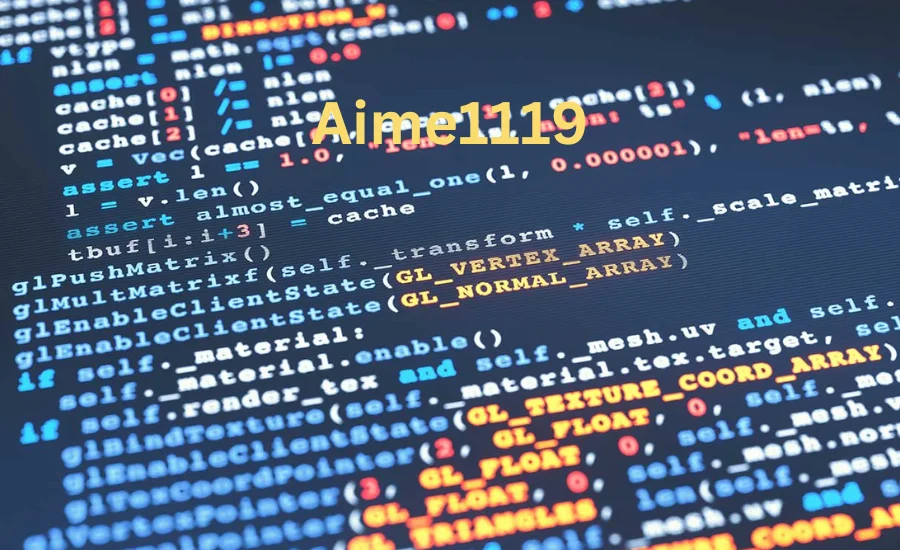In the modern digital world, the role of keywords, identifiers, and unique codes is vital for the seamless operation of numerous technological systems. Among these, the identifier “AIME1119” may not be immediately familiar to everyone. However, it holds considerable importance within certain specialized areas, including data management, product tracking, software engineering, and security frameworks. This article aims to shed light on the significance of AIME1119, examining its various uses and offering a detailed explanation of how this particular identifier enhances different technological and business operations.
Understanding AIME1119
AIME1119 is a distinctive identifier utilized across various domains such as technology, data management, and product oversight. This unique code functions as a crucial reference point within systems and databases, facilitating the effective tracking, categorization, and organization of information. By providing a clear and specific label, AIME1119 ensures that data, products, or software components are easily identifiable and accessible. Its role is essential for maintaining accurate data records, enhancing security measures, and streamlining operational processes. The use of such unique identifiers is fundamental to ensuring data integrity and operational efficiency across different applications.
Applications of AIME1119

The identifier AIME1119 is a versatile tool that finds application across a wide array of sectors, each benefiting from its unique capabilities. Whether in data management, product tracking, software development, or security systems, AIME1119 plays a pivotal role in enhancing operational efficiency and accuracy. Let’s delve deeper into how AIME1119 is utilized in various fields and understand its significance in maintaining robust systems and processes.
Data Management Systems
In the realm of data management, the integrity and precision of information are paramount. AIME1119 functions as a unique identifier within databases, assigning a distinct code to each data entry. This is crucial for maintaining clarity and organization within vast amounts of data. By ensuring that every record is individually identifiable, AIME1119 helps in managing, accessing, and updating data with a high degree of accuracy.
For large-scale databases, where the risk of data duplication or mismanagement is pronounced, AIME1119 acts as a safeguard. It reduces the likelihood of errors and ensures that each entry can be easily tracked and modified without confusion. This capability is vital for organizations that rely on accurate data for decision-making and operational processes.
Moreover, AIME1119 significantly enhances traceability within data management systems. Organizations can track modifications made to data entries over time, providing a transparent history of changes. This feature is especially beneficial in industries where data accuracy is critical, such as in finance,software engineering, healthcare, and logistics. For instance, in healthcare, accurate patient records and their historical changes are crucial for effective treatment and compliance with regulatory standards.
Product Identification
In the field of inventory and product management, AIME1119 serves as an essential tool for tracking products throughout their lifecycle. As a Stock Keeping Unit (SKU), AIME1119 provides a unique identifier for each product, facilitating efficient tracking from production through the supply chain to the point of sale.
Using AIME1119 as an SKU streamlines inventory management processes by reducing the likelihood of errors and improving the accuracy of product tracking. This efficiency is crucial for businesses looking to maintain optimal inventory levels, manage supply chain logistics, and ensure that products are readily available to meet customer demand.
Additionally, AIME1119 contributes to greater transparency in the supply chain. With a unique identifier for each product, businesses can monitor the movement of goods in real-time, identify and address potential bottlenecks, and enhance overall supply chain visibility. This level of traceability is particularly valuable in industries where quality control and product recalls are critical, such as in the automotive or food and beverage sectors. For example, in the event of a product recall, having a unique identifier like AIME1119 allows companies to swiftly locate and address affected products, minimizing potential risks to consumers.
Software Development
In the dynamic world of software development, organization and efficiency are key to successful project management. AIME1119 can be employed as a reference code within a software codebase, acting as a unique identifier for specific features, modules, or components. This practice enables developers to quickly locate and reference particular parts of the code, simplifying maintenance and updates.
As software systems become increasingly complex, maintaining an organized codebase is crucial for preventing errors and ensuring that the software remains scalable and adaptable. AIME1119 aids in this process by providing a clear and distinct reference point within the code, which helps in managing changes and coordinating development efforts.
In addition to facilitating code management, AIME1119 can be utilized in version control systems. By assigning a unique identifier to each code modification, developers can track changes over time, maintain a detailed history of updates, and easily revert to previous versions if necessary. This functionality is especially useful in collaborative development environments, where multiple developers work on different aspects of the code simultaneously.
Database Management
When it comes to database management, AIME1119 can serve as a primary key, ensuring that each record within the database is uniquely identifiable. This role is fundamental to maintaining the integrity of the database and ensuring that relationships between tables are accurately preserved.
Using AIME1119 as a primary key also supports enhanced data security. With each record having a unique identifier, organizations can implement more stringent access controls, restricting who can view or modify specific data. This heightened level of security is essential for protecting sensitive information and maintaining overall database confidentiality.
Furthermore, AIME1119’s role in database management extends to optimizing data retrieval processes. By ensuring that records are distinct and easily accessible, AIME1119 contributes to the efficient retrieval of information, which is crucial for organizations that rely on swift and accurate data access for their operations.
Security Systems
In the realm of security, AIME1119 plays a critical role in safeguarding data and ensuring that access is restricted to authorized users. It can be utilized as part of encryption protocols or authentication systems, where its unique identifier is crucial for securing data transmissions and protecting sensitive information from unauthorized access.
AIME1119 can also be integrated into multi-factor authentication (MFA) systems. In MFA, users are required to provide additional credentials alongside a unique identifier like AIME1119, adding an extra layer of security. This approach helps to mitigate the risk of unauthorized access and enhances the protection of valuable data. This application is particularly important for industries that handle highly confidential information, such as financial institutions, healthcare providers, and government agencies.
The Critical Role of Unique Identifiers

Unique identifiers, such as AIME1119, are fundamental to the efficiency and effectiveness of contemporary technology and business operations. Their significance stems from their capacity to deliver precision, traceability, and security across a wide range of systems and applications. Here’s an overview of the essential advantages provided by unique identifiers like AIME1119:
- Enhanced Accuracy: Unique identifiers ensure that each item, record, or component is distinctly and accurately recognized within a system. This precision helps in reducing errors and avoiding confusion, particularly in environments where large volumes of data or numerous products are managed.
- Improved Traceability: By assigning a unique code to each entity, identifiers like AIME1119 facilitate comprehensive tracking and monitoring. This traceability is crucial for maintaining detailed records of changes and movements, which is particularly valuable in sectors such as finance, healthcare, and logistics.
- Strengthened Security: Unique identifiers play a critical role in bolstering security measures. They help in controlling access to information and systems, ensuring that only authorized users can interact with sensitive data or components. This feature is vital for protecting against unauthorized access and data breaches.
Enhancing Data Integrity
One of the key benefits of using unique identifiers is their crucial role in maintaining data integrity. By assigning a specific code to each data entry, product, or software component, organizations can ensure that their information remains accurate and consistent across various systems. This is especially vital in sectors where precise data management is essential, such as in finance, healthcare, and logistics.
For example, AIME1119 and other unique IDs are used in the healthcare sector to efficiently handle patient records. These IDs make sure that data is consistently captured and easily available by assisting in the accurate tracking of each patient’s information. This reduces the possibility of mistakes like giving patients the wrong medication or treatment, while also improving the quality of patient care. Healthcare providers may enhance patient safety and operational efficiency by utilizing unique IDs, underscoring the significance of precise data management in vital domains.
Boosted Traceability

Unique identifiers are instrumental in significantly enhancing traceability across various processes. Whether it’s monitoring products as they move through the supply chain, tracking modifications within a software codebase, or overseeing data entries in a database, unique identifiers such as AIME1119 offer a clear and easily traceable record of activities. This capability is crucial in sectors where transparency and accountability are paramount, including manufacturing, logistics, and software development.
For instance, in the manufacturing sector, unique IDs let businesses monitor every product all the way from the procurement of raw materials to the finished product. This improved traceability, which enables producers to identify and address problems at any step in the production process, is essential for upholding high levels of quality. Businesses may guarantee better quality control, increased transparency, and quick resolution of manufacturing-related issues by putting unique identifiers into place.
Integrating AIME1119 into Your Systems

Integrating unique identifiers such as AIME1119 into your systems can significantly enhance data accuracy and traceability. To ensure a smooth and effective implementation, consider the following essential steps:
Define the Context
Begin by clarifying the specific application or system where AIME1119 will be used. Whether it’s for data management, product inventory, software development, or security protocols, understanding the context is crucial. This step helps determine how AIME1119 will function within your system and identifies any specific requirements it must fulfill.
For instance, if AIME1119 is being used as a Stock Keeping Unit (SKU) for product tracking, ensure that the identifier aligns with your existing inventory management system and integrates smoothly into your supply chain processes.
Ensure Uniqueness
The next step is to establish processes to maintain the uniqueness of AIME1119 within your system. This involves setting up rules for generating identifiers, ensuring that each entry is distinct, and regularly checking the system to prevent duplication.
In a database setting, for example, you can use automated systems to generate unique primary keys for each record. This prevents conflicts and ensures that every entry remains distinct and identifiable.
Integrate with Existing Systems
Seamless integration of AIME1119 with your current systems is vital. This may require updates to your software, databases, or inventory tools to accommodate the new identifier. It’s also important to train your staff on how to utilize and manage the new identifier effectively.
For example, in a software development environment, you might need to update your version control systems to recognize AIME1119. Ensuring that your team understands how to use the identifier when referring to specific code modules or features is also crucial for maintaining efficient workflows.
Monitor and Maintain
Ongoing monitoring and maintenance are essential to ensure that AIME1119 continues to meet your needs effectively. Regularly review the system, make necessary adjustments, and address any issues that arise to maintain the benefits of data integrity, traceability, security, and efficiency.
In a product inventory system, for instance, periodic reviews of SKUs can help verify their relevance and detect any duplicates or outdated entries. This helps preserve the accuracy and efficiency of your system, ensuring it continues to operate smoothly over time.
By following these steps, organizations can successfully integrate AIME1119 into their systems, leveraging its unique identifier capabilities to enhance operational effectiveness and data management.
Final Words
AIME1119 is a vital identifier used in various technological and business systems, enhancing accuracy, traceability, and security. In data management, it ensures precise and error-free tracking of records, while in product management, it streamlines inventory control and supply chain visibility. AIME1119 also aids in software development by organizing codebases and supporting version control. Its role in security systems strengthens data protection through unique identification and access control. By integrating AIME1119, organizations can improve operational efficiency, maintain data integrity, and achieve robust system management across multiple domains.
For more comprehensive content and expert opinions, head over to Discover Thrill.









Leave a Reply
View Comments